Has this ever happened to you:
You are browsing a website, searching for specific information about a product they are offering. You type in some keywords to the search box, and you get – nothing.
It’s frustrating and annoying in times of fast results via voice search and Google not to find the answer you are looking for on the website you thought would offer it. If you’re anything like me, you leave the page frustrated and look for something better.
Most organizations and companies still underestimate how important it is to have a well-functioning and optimized internal site search. Your site search tool can be the deciding factor between a happy customer and a frustrated user who won’t come back.
That’s why we’ve collected the most important on-site search statistics for e-commerce and all other websites you need to understand to be able to optimize your internal search.
Table of Contents
1. Up to 30% of Visitors Use a Site Search Box When One is Offered
This one answers one of the most common questions we get: What percentage of users use site search?

Even if not all of your visitors will use them, your search box is highly important for your site’s success. Visitors who use site search tend to be highly motivated users (see Stat 2) who are further along in the sales funnel and more willing to buy. When they use the search box, they already have an idea of what they are looking for, and they want to find it on your website. This is why it’s so vital that your site search is optimized and offers relevant results for these users.
2. Site Search is 1.8x More Effective at Producing Conversions
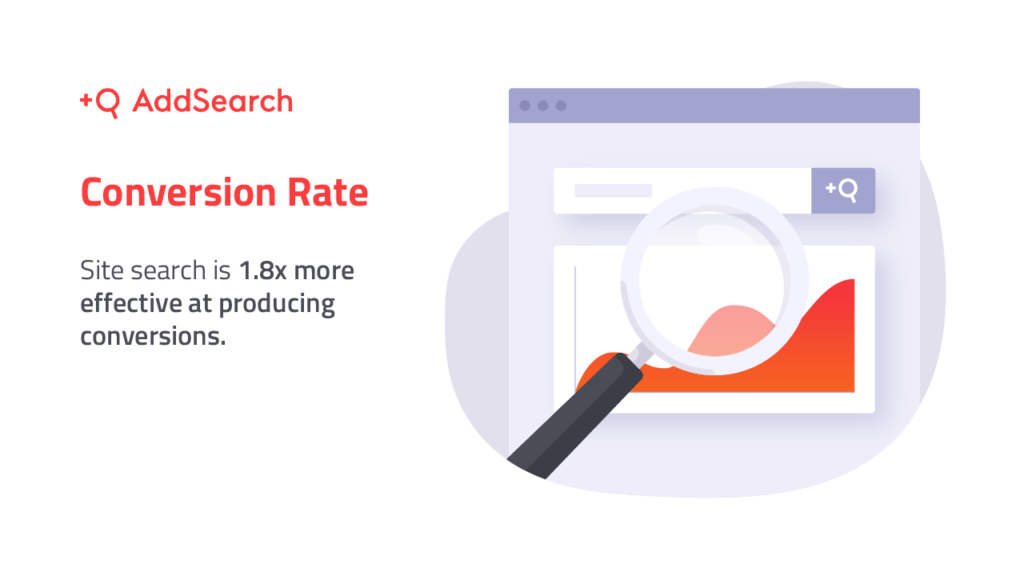
When you invest in optimizing your site search, you will not only improve your user experience but also your conversions. Research has shown that when a search is used, it increases conversions. A study by eConsultancy showed that while the average conversion rate across all websites measured at 2.77%, site search users converted at 4.63%. Based on this stat, it’s safe to say that the site search conversion rate is pretty good!
3. In Studies, 15% of Total Visitors Used On-Site Search, But These Visitors Accounted for 45% of All Revenue
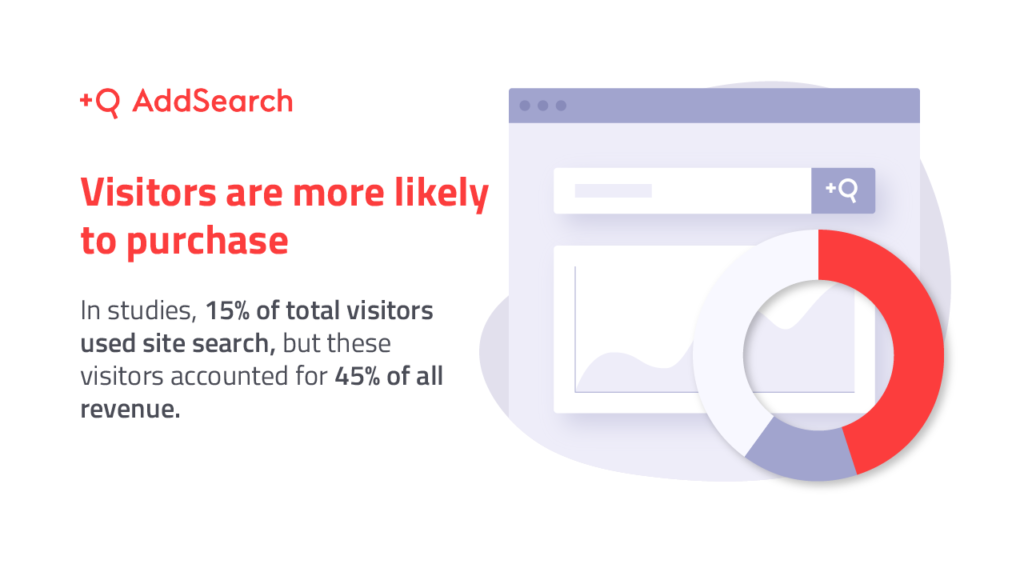
If this doesn’t sell you the site search, I don’t know what else will. People who use site search on eCommerce sites are more likely to purchase products. In fact, conversion rates through site search can be up to 50% higher than average.
When a visitor uses site search, they are more likely to be in the final stage of their buying process. They might just want to compare prices, check availability, or find out about delivery fees to decide on the product they want to buy. Site search can be a moneymaker because it can increase your customer loyalty & retention and increase site usage.
4. 84% of Customers Want to Solve Their Own Problems Using Search Engines

Visitors who use search want to solve their problems instead of spending time sending out support tickets or calling the customer service department. In a study by Parature, 84% of customers wanted to find a solution by themselves using search engines.
When you optimize your site search, you thereby also reduce the cost of your customer service department. Instead of offering costly and time-consuming answers to users, they can easily find the solutions themselves online.
5. As Many as 68% of Shoppers Would Not Return to a Site That Provided a Poor Search Experience

We live in a time where you can google anything and get relevant results within milliseconds. Users are accustomed to this kind of service, and they are not willing to settle for less. They expect your site search to be personalized (location, preferences, etc.), fast, and offer relevant results (no zero results page). A great site search can give you a competitive edge compared to other websites.
Experience the Best in Search Solutions with AddSearch – Top Rated on SourceForge! Click for Your Free, Personalized Demo Now.

6. Nearly 84% of Companies Don’t Actively Optimize or Measure Their On-Site Search
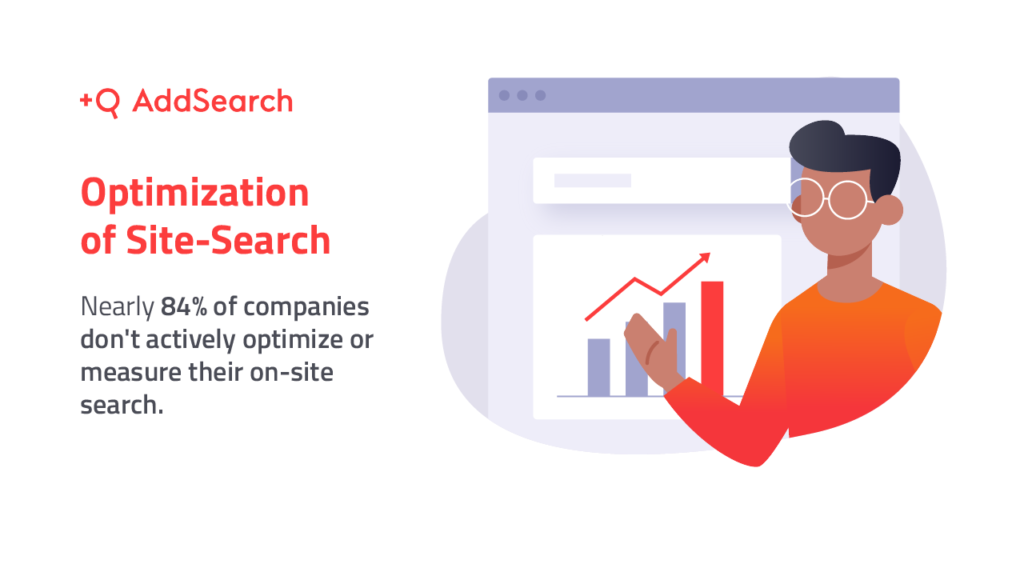
This site search statistic might surprise you.
By now, it should be clear why optimizing your site search is so important. Shockingly, though, nearly 84% of companies don’t actively optimize or measure their on-site search. If you invest some time and money into optimizing your site search, you can stand out quite quickly. The following stats give you some ideas on what you can optimize.
7. 52% of Web Traffic Worldwide is Mobile

2015 was the tipping point between mobile and desktop search on Google. Since then, more searches have been conducted on mobile than on desktop. For any website owner, optimizing your website and your search for mobile is vital. If you want to find out how to do that, you can read more in this blog post, where we discuss everything about mobile search.
8. As of January 2018, There Were About 1 Billion Voice Searches Per Month
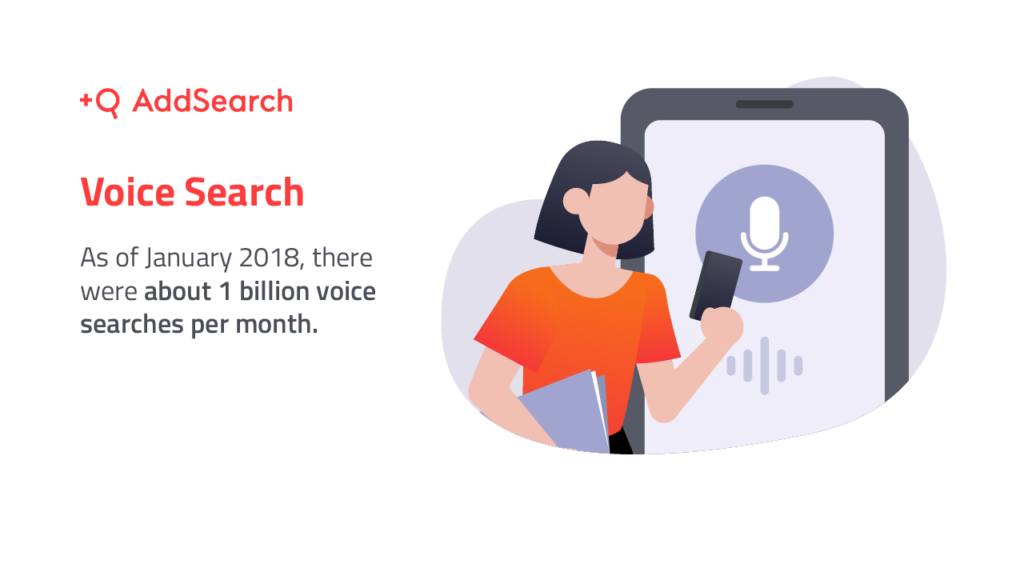 Voice search is handy, easy to use and a great way to find information when you have your hands full (literally). No wonder 71% of people prefer searching through voice-over to searching by typing. Voice search has a huge potential. In fact, nearly 40% of all internet users in the US are already users of voice search (tendency rising). To find out everything you need to know about voice search, who it is relevant for, and how to optimize it, have a look at this blog post.
Voice search is handy, easy to use and a great way to find information when you have your hands full (literally). No wonder 71% of people prefer searching through voice-over to searching by typing. Voice search has a huge potential. In fact, nearly 40% of all internet users in the US are already users of voice search (tendency rising). To find out everything you need to know about voice search, who it is relevant for, and how to optimize it, have a look at this blog post.
9. 50% of Search Queries are Four Words or Longer
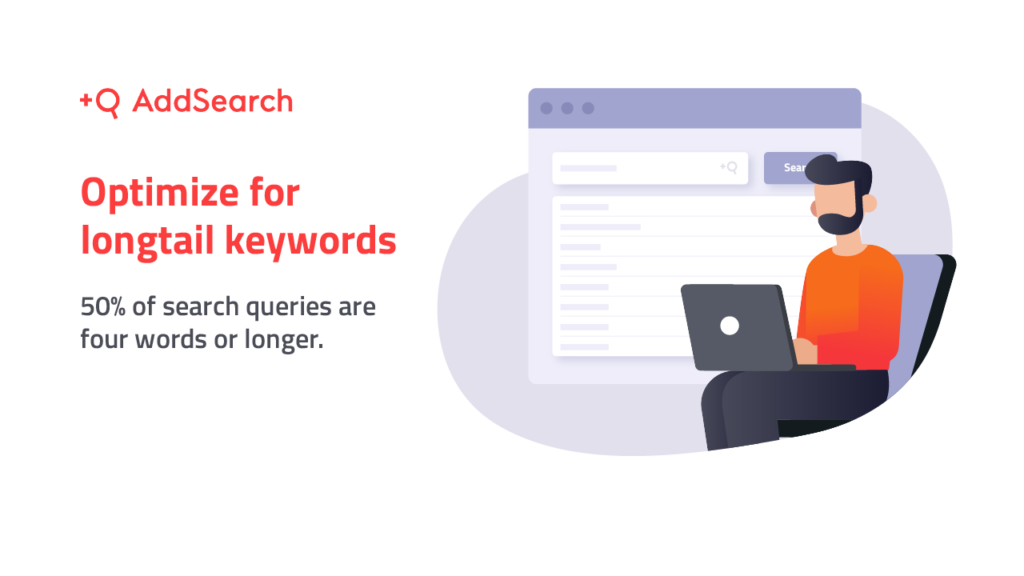
Long-tail keywords are powerful, and they are quite popular among users. Compared to short-tail keywords (“red dress”), long-tail keywords are more specific and offer a great opportunity to rank for (“red dress fair trade”). Even though they get less traffic, they often have higher conversion rates because the users are looking for something very specific.
As you can see, longer search queries took up half of the search queries in 2019, which is why they deserve our attention as marketers and website owners.
Summing Things Up
Why is Site Search Important?
It helps website visitors find the content they are looking for quickly and easily. A good site search function increases user satisfaction and engagement, leading to longer website visits and more conversions. By analyzing the data from site searches, businesses can also gain valuable insights into what their customers are searching for and adjust their marketing strategies accordingly. Effective site search can lead to improved user experience, higher customer retention, and, ultimately, increased revenue for the business.
We hope that this compact on-site search statistics article will help you decide whether to implement an internal search for your website or not.
How has the search been working for you? Have you noticed how a good or poor site search influences your business? Let’s talk!










